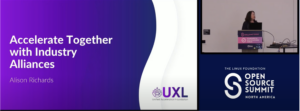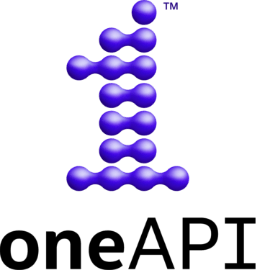Accelerate Together with Industry Alliances: UXL Foundation

The Linux Foundation Open Source Summit North America hosted in April 2024 in Seattle, Washington, featured the first Standards and Specifications Forum, bringing together professionals from the Linux Foundation, standards organizations, open source developers, and specification editors to foster collaboration and discussion on specification development and adoption.
Alison Richards of Intel Corporation shared her insights on how ‘industry alliances can advance hardware acceleration technologies’ using the Unified Acceleration Foundation (UXL) as an example, focusing on the importance of adhering to an open specification and open source to drive open accelerated compute. These new architectures perform matrix operations and can process vast volumes of data in parallel, hence addressing intensive AI workloads.
However, the above transition has been stymied by proprietary software stacks, limiting access and more importantly, accelerated innovation by developers. Hence, there are opportunities to create open source, standards-based programming models to make it easy for developers to transition code built on one architecture to other vendor processors.
Evans Data Corporation has found that 48% of developers today are targeting heterogeneous systems defined by using more than one kind of processor requiring unique languages, tools, libraries and added complexity for developers and limits code reuse. Developers really don’t want to have to program in different ways for different devices because it is laborious and involves steep learning and wasted time.
The UXL Foundation addresses the above problem with the oneAPI specification and open source projects. The primary goal is to unify programming across heterogenous hardware platforms, making it easy to navigate across a variety of CPUs, GPUS, FPGAs, and accelerators, including Edge and Edge AI. The foundation is built on a solid base of the oneAPI spec and open source projects contributed.
“Open technologies have powered the last decade of innovation and surely will power the next decade. We want to give developers a choice to do what they want and drive down the level of software created by the vendors with standards and code optimization” says Alison Richards.
The primary mission of the UXL Foundation is:
-
- Build a multi vendor, multi architecture software ecosystem for all accelerators
- Unify the heterogeneous compute ecosystem with open standards
- Build on and expand open source projects for accelerated computing
All of UXL Foundation’s current and future members are a big part of this journey and the one API specification project contains both OS code and fundamental software building blocks for the developers, including libraries for math operations, AI, and multi node systems like supercomputers, etc. The projects provide the fundamentals of the software stack, delivering highly optimized APIs. Developers do want to use a single API to write their code for multi-vendor and multi-architecture ecosystems.
The UXL Foundation has special interest groups (SIGs) which are open for developers to join: AI, Hardware, Language, Math and Safety Critical.
There is the need for collaboration with standards bodies. It can take a long time to get standards and specs, and to work together as a community. It is well known that standardization has historically been done through consensus voting and discussion and everything is scrutinized and discussed.
The UXL Foundation is providing targets to span multiple processor vendors. It’s important that if a developer does write code, there’s an expected behavior regardless of the vendor processor that’s being used. By having a broad set of devices to test on, and a good set of tests we can ensure that there’s heightened compatibility across vendors. If a vendor does not implement a particular API, it’s important that the developer understands this and ideally there’s a fallback provided.
The UXL Foundation has both a spec and an open source implementation and we want to ensure that that specification forms a contract between the developer using the project and the project team. The open source project teams and the community are now able to jointly innovate and develop new features for experimentation. We also need to determine rules for releases.
We have dependencies on other standards and need to forge worthwhile relationships with other organizations, but it can’t slow us down. Developers just want to be productive when they write code, and they want things to work in languages that they already know.
We are building an infrastructure, and we are working on common goals with other foundations such as the Kronos Foundation, as we have dependencies with C++. Another alliance examples includes Autoware, to showcase use of oneAPI in the automotive and Edge market.
Alison Richards’s talk at the Open Source Summit was a profound reminder of the power of collaboration in the tech industry. By joining forces under initiatives like the UXL Foundation, we can all contribute to shaping a future of accelerated computing technologies. Her call to action invites developers and industry professionals to join in these efforts, contributing to a future where technology transcends traditional boundaries and is accessible to all.
References:
-
- UXL Foundation: https://uxlfoundation.org/
- oneAPI: https://www.oneapi.io/
- YouTube: https://youtu.be/MvuEuthCHhM?si=LKl2lzzWvHwf4d51
- Slack: https://uxlfoundation.slack.com/
Join us today!
